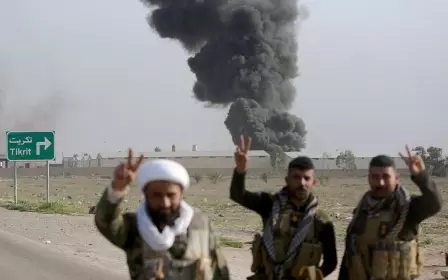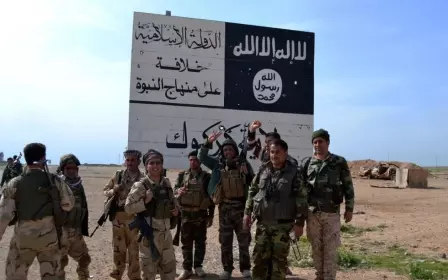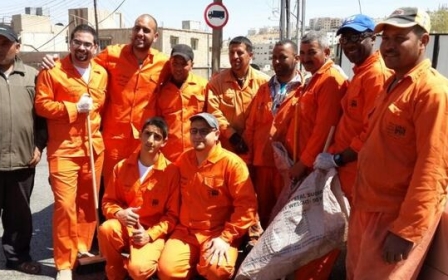IS claims execution of 'Israeli spy': Video
The Islamic State (IS) released a video Tuesday purporting to show a young boy executing a Palestinian Israeli who it claimed infiltrated the group in Syria as a spy.
In the video, a youth identifying himself as 19-year-old Mohammed Said Ismail Musallam recounts how he was recruited by Israeli intelligence.
Dressed in an orange jumpsuit that is standard in videos of IS executions, he is shown kneeling in front of the boy, who appears to be no more than 12 years old, and a man standing at his side.
The man, speaking in French, issues threats against Jews in France, before the boy walks around in front of the hostage and then shoots him in the forehead using a pistol.
The boy, who shouts "Allahu Akbar" ("God is greatest" in Arabic), then shoots the man four more times as he lies on the ground.
In February, Musallam's father denied in comments to AFP the IS claim that his son was an Israeli agent.
"My son is innocent; IS accused him of working for Mossad because he tried to run away," Said Musallam said, claiming that his son had travelled to Syria to join the extremist group.
He told the Associated Press: "I saw him with a long beard and long hair and a Kalashnikov ... He told me: 'Look dad, I am fed up here, it is a country of war, and I want to come back.'"
Following release of the video on Tuesday, Musallam said he did "not know anything".
"People are calling us; they told us IS sent a video in which Mohammed says he works for the Israeli Shin Bet. That's not true; my son doesn't work for the Shin Bet. IS did this to scare the world.
"He's dead, he's a martyr. Mohammed is just a child, like a baby, only 19 years old."
'Absolutely not religious'
"He is absolutely not religious," Musallam said earlier, adding that perhaps his son had been recruited through the Internet.
Mohammed's brother, Abdullah, told the Israeli news site Ynet that: "My brother was a little boy who did not care for religion or politics. Daesh (IS) used him and tricked him."
Mohammed's family has said that he disappeared while on a tourist trip to Turkey.
Dabiq, the IS online English-language magazine, said Mohammed had been tasked by Israel with gathering information on IS bases and weapons and on Palestinians volunteering to fight for the group in Syria.
A spokesman for Israel's Shin Bet security service told AFP Mohammed had left home on 24 October "on his own initiative", implying that he had not been sent by Israel.
Official Israeli policy is not to comment on such allegations.
The Shin Bet spokesman said Mohammed travelled from Israel to Turkey and "from there crossed to Syria and joined IS to fight for the organisation".
Said Musallam said his son, an Israeli citizen, abandoned his national service in the fire department to join IS.
He said the last time they spoke by phone Mohammed was in Raqqa, the self-proclaimed capital of the IS "caliphate" in northern Syria.
He said his son wanted to return home after having completing basic training.
He was very worried about his son's fate at the hands of IS, which has brutally executed many prisoners in recent months.
Asked if he could raise a ransom in exchange for his son, the father said he was a mere bus driver with no property or assets to his name.
The family lives in the Jewish settlement neighbourhood of Neve Yaakov in Israeli-occupied East Jerusalem.
Said Musallam was born in the occupied West Bank but said his four children have Israeli passports.
According to Dabiq, Mohammed was recruited in Neve Yaakov by a Jewish neighbour working for the security services and was given away by his behaviour and his refusal to obey a commander.
The execution video released on Tuesday was one of a number produced by IS, starting with the beheading last August of US journalist James Foley and more recently including the burning to death of a captured Jordanian pilot and the beheading of 21 Coptic Christians.
Dalia Ghanem-Yazbeck, an analyst at the Carnegie Middle East Center in Beirut, said the videos tend to coincide with IS military setbacks.
"With each military reverse ... IS comes out with a shock video so that people will talk about them. This is a way to compensate for the military defeat with propaganda," she said.
Since early this month, Iraqi forces have besieged Tikrit, a city captured by IS in a lightning sweep across the country's north last summer.
The video campaign is also seen by analysts as a recruitment vehicle for IS, which is thought to have between 25,000 and 80,000 fighters, including thousands of foreigners.
New MEE newsletter: Jerusalem Dispatch
Sign up to get the latest insights and analysis on Israel-Palestine, alongside Turkey Unpacked and other MEE newsletters
Middle East Eye delivers independent and unrivalled coverage and analysis of the Middle East, North Africa and beyond. To learn more about republishing this content and the associated fees, please fill out this form. More about MEE can be found here.




